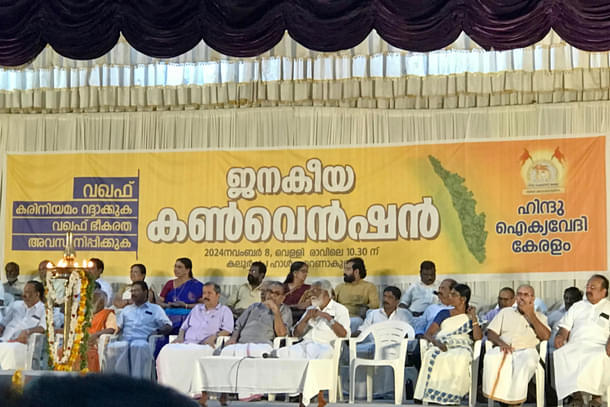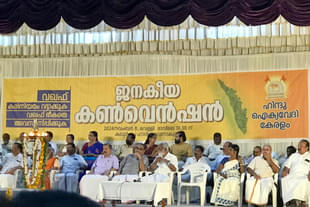Kerala
Ground Report From Kerala: How Sangh And Civic Groups Are Convincing People That The Current Waqf Law Must Go
Venu Gopal Narayanan
Nov 10, 2024, 01:12 PM | Updated Nov 15, 2024, 05:33 PM IST
Save & read from anywhere!
Bookmark stories for easy access on any device or the Swarajya app.


A public discourse against the Muslim Waqf Board’s unfettered right to claim any plot of land as its own has been gaining increasing traction over the past month.
Decibel levels have further risen since it is also election season — Maharashtra and Jharkhand go to the polls shortly, and a clutch of byelections are taking place in multiple states.
To secularists, Islamists, and the usual suspects, this is one more reason to rail against their pet bugbear — ‘Hindu majoritarianism’ embodied by the Rashtriya Swayamsevak Sangh (RSS) — not least because of a twin, existential fear, that they would either lose their prized, captive non-minority vote bases, or, worse, have their identity vote banks rendered electorally ineffective in the face of a supra-caste consolidation.
While the Sangh’s narrative is national and led by the Bharatiya Janata Party (BJP), its implementation is very local and led by tiny, often unheard-of organisations. At its root lie two elemental truths: one, that no community can be given special privileges in a democracy, and two, that minority appeasement is a threat to the state. The Sangh's form varies from one jurisdiction to another, as do the elements employed to spread this message.
At the national level, this narrative is led by the phrase, ‘ek hai toh nek hai, batoge toh katoge.’ It essentially translates as: ‘unity is nobility, disunity is fatal.’ In Maharashtra, the programme is called ‘Sajag Raho.’ Its primary focus is not even the unfairness of a Waqf board’s powers, but the awakening of ‘Shatrubodh’ within citizens — a raising of awareness about the prevailing threats to society, and a clarion call for rising above caste divides. Interestingly though, rather than being run by the Sangh, ‘Sajag Raho’ is, in fact, being conducted by dozens of obscure NGOs.
In Kerala, the Waqf narrative is driven by the Hindu Aikya Vedi, who held a large convention in Ernakulam on 8 November. The topic: the Waqf Amendment Bill which is set to be introduced in the forthcoming winter session of parliament. The issue — the plight of hundreds of families at Munambam (Cherai beach, on the Periyar river mouth, near the old Chera capital of Kodungalloor) affected by a Waqf possession decree on their lands.
By Sangh standards in Kerala, where outfits are hard-pressed to collect a few hundred people for a public meeting, the turnout was unprecedented, and the large auditorium was packed. About two dozen representatives of every single community in the state were present on stage including, to much surprise, a self-effacing member of Kerala’s Yadava Sangamam. (Who knew there were Yadavs in Kerala?) All spoke in turn.
KS Radhakrishnan of the BJP explained why the existing Waqf Act was a black law in legal terms. Valsan Thillenkeri of the Aikya Vedi provided the moral reasoning for why the law had to go. Others, including Muslims and Christians, offered their comments on how the proposed amendment ought to be framed, and why the existing law was a threat to our society; how it promoted divisiveness, insularity, cultural separatism, radicalism, violence, and a loss of love for the motherland. One speaker called it “Land Jihad,” and another explained the commercial angles behind it.
While the specifics varied, the theme remained common: a strident, unapologetic tone, and repeated emphasis that no one was anti-Muslim, only anti-appeasement. Their target, they all said, was secularism, not Islam.
But the star of the show was Shaun George of the BJP, a primary organiser of the ongoing protests at Munambam. He not only described his firsthand experience with refreshing eloquence but also took the Congress party and the Marxists to the cleaners in style.
Secularism in Kerala, he said, ought to be termed ‘Al-secularism’, for the manner in which these political parties bend over backwards for the identity vote. Why are various outfits carrying out solidarity marches only in support of Palestine, he asked, when it was Israel which got attacked in the first place? And the zinger: “Did Donald Trump criticise the Muslim League or something, for him to be hated so much in Kerala?”
From an analytical standpoint, the convention is important for many reasons. The selection of Munambam as an epicentre is a very smart move because the area represents a cross-section of society; its demographic spectrum of affected citizens is comprehensive and includes Muslims. That makes the messaging so much easier since Munambam can be presented as a microcosm of the ills at play in India.
This broadens the appeal, allowing it to resonate more powerfully with audiences. Added to this is a new tone, bluntly stating that if something is harmful to our way of life, then it must be excised forthwith without compunction; one cannot allow wounds to fester; and if anyone tries to twist that truth into some form of minority victimhood, they too are seen as a threat because, in the end, Dharma must prevail.
This combined strategy also raises the efficiency of various outreach programmes conducted by the Sangh across castes and faiths. Shaun George is an example. He has no confusion in his mind about either god or country. Like any normal Hindu, Sikh, Zoroastrian, or otherwise, he is as proud of his religious and cultural identity as he is of his national identity. He is Christian because he is Indian, and he is Indian because he is Christian. And that, really, is all India needs to overcome the ideological tyranny imposed long ago by dead white men.
This is how the national Waqf narrative is working on the ground. It encompasses multiple elements: raising awareness on numerous burning issues at the grassroots level, bridging religious divides, forcing people to break out of caste barriers imposed by Marxist-inspired hate, and spreading the message of unity.
And it is gaining traction.
Venu Gopal Narayanan is an independent upstream petroleum consultant who focuses on energy, geopolitics, current affairs and electoral arithmetic. He tweets at @ideorogue.




